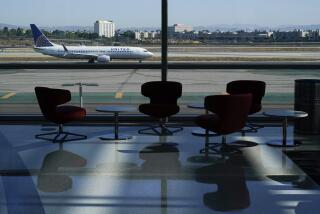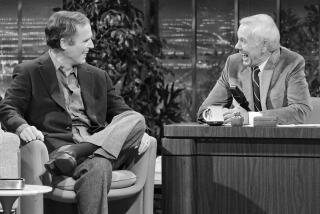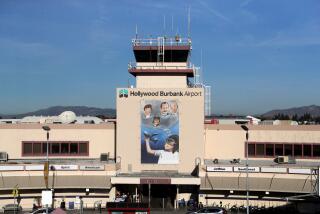Cost of Airport Security in Burbank Is Going Up
Security upgrades at Burbank Airport will likely cost several million dollars more than the original estimate of $25 million, in part because of design changes requested by the federal government, officials said Monday.
Officials also warned that departing passengers who check luggage might experience longer delays as the airport implements new federally required baggage-screening measures before year’s end.
“It’s part of our ongoing needs for security,” said Dios Marrero, executive director of the Burbank-Glendale-Pasadena Airport.
To accommodate new explosives-detecting machinery as well as beefed-up passenger screening -- required by federal law in the wake of the Sept. 11 terrorist attacks -- the airport is expanding its 173,000-square-foot terminal by 40,000 square feet. The terminal will have more passenger check stations, a wider ticket lobby and office space for security personnel.
Right now, only a fraction of Burbank’s checked luggage is inspected. But the federal government requires that all baggage be screened by Dec. 31. Until new luggage-screening technology can be fully installed -- possibly by next spring -- security officers will use hand-held explosives detectors on baggage throughout Terminal A and in parts of Terminal B, officials said.
Dan Feger, deputy executive director of the airport, said costs would eclipse the original estimate by several million dollars, though he could not give a more precise figure. Reasons for the increase include higher-than-expected costs for new technology as well as design changes.
Federal officials asked the airport to build a mezzanine to improve the work environment for federal employees, an enhancement that will cost hundreds of thousands of dollars, Feger said. The cost of new baggage-moving equipment is also expected to rise because of increased demand nationwide.
A couple of airport commissioners chafed at the higher cost and expressed hope that the federal government would help pay for the project.
Transportation Security Administration spokesman Brian Doyle said the agency is already paying for new screening machinery as well as the salaries of federal security personnel now stationed at all airports. Individual airports, for now, are responsible for their own construction costs, he said.
To help pay for the security-enhancement project, airport commissioners approved an increase in passenger fees, from $3 per ticket to $4.50. With 2.2 million to 2.3 million departures a year, the fee increase is expected to generate more than $3 million annually.
The rest of the project cost is coming from the airport’s reserves, currently at $58 million, said spokesman Victor J. Gill.
More to Read
Sign up for Essential California
The most important California stories and recommendations in your inbox every morning.
You may occasionally receive promotional content from the Los Angeles Times.









